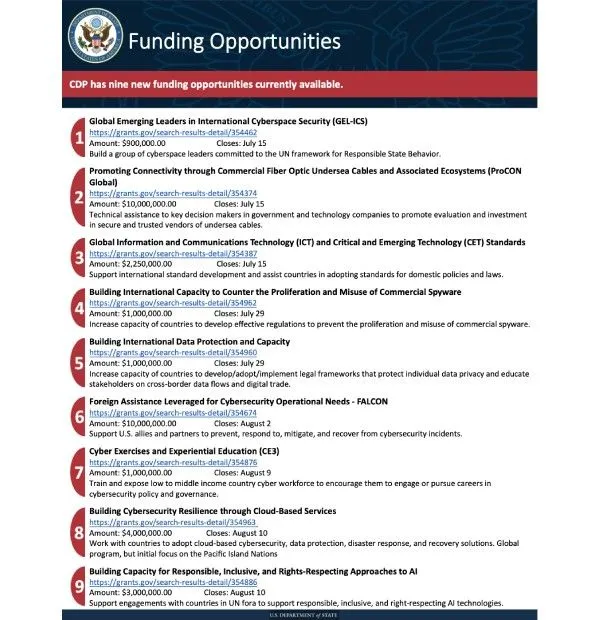
2024-9-25 00:16:27 Author: therecord.media(查看原文) 阅读量:26 收藏
The U.S. State Department’s cyber bureau is ready to shell out almost $35 million in foreign aid for an array of projects around the world, as Washington aims to boost the digital acumen of allies and take the lead in shaping international norms for cyberspace ahead of other countries like China. The spending spree marks a new era for the relatively young Bureau of Cyberspace and Digital Policy. Created by Congress in 2022 to strengthen U.S. cyber diplomacy against potential threats and deal with emerging technologies, such as artificial intelligence, the office has seen its foreign assistance accounts balloon from $17 million to over $90 million. Previously, Foggy Bottom relied on a hodgepodge of authorities, processes and pots of money, including one-time grants, to help allied nations — especially Ukraine, Albania and Costa Rica — enhance their cybersecurity after digital assaults. “The impetus for going through all the effort and the bureaucratic process of creating these mechanisms has largely been based on real world lessons looking at those places,” according to Nathaniel Fick, State’s ambassador-at-large for cyberspace and digital policy. “I wish we could have gotten dollars out the door a lot faster and selected vendors a lot more quickly.” He noted Albania in particular, where government services were knocked offline in 2022 following attacks by Iranian hackers. Fick and other U.S. diplomats were among the first on the ground, in a show of solidarity with the NATO partner, but “it took months for the follow-on tech assistance to actually flow into place.” That commitment “would have been faster and more targeted had we had these tools. Now we do have the tools. So, in the future, our response will be faster and more targeted,” Fick told Recorded Future News in an interview last week. In all, his agency will finalize contracts and agreements for nine projects by October 1 — coinciding with the end of the current fiscal year — that range from rapid cyber incident response and countering the misuses of commercial spyware to better safeguarding undersea cables and increasing cloud-based security in the Pacific. Image: U.S. State Department The efforts align with goals to establish a secure, global ecosystem first outlined in the Biden administration’s 2023 national cyber strategy and fleshed out earlier this year when the State Department issued the first international cybersecurity strategy in over a decade. The initiatives are, and will be, backed by multiple funding streams, including the 2022 CHIPS and Science Act, the bureau’s baseline budget and its Digital Connectivity and Related Technologies Fund, which congressional lawmakers created last December and will soon begin doling out cash from its $50 million reservoir. Of the upcoming slate of assistance efforts, the nation’s cyber ambassador singled out two. First is the Foreign Assistance Leveraged for Cybersecurity Operational Needs, or FALCON, a rapid response tool that utilizes “best in breed” private sector incident response capabilities across a number of vendors in order to address or cauterize cyber vulnerabilities for U.S. partners and allies — ideally within 48 hours of the initial request. The initiative marks an “innovative shift in how we deliver assistance that could bear fruit for the long haul across… dozens and dozens of different use cases,” according to Fick. He called the Pacific Islands undersea cable project “unprecedented.” The multilateral effort will see the U.S., along with foreign governments in the region, contribute modest funds to add a branch to an existing commercial project by Google to lay 25,000 kilometers of trunk cable and help the countries connect to the digital ecosystem. The small and sometimes isolated nations have become an area of intense focus in recent years, with both Beijing and Washington courting them with infrastructure development and military partnerships. “It's really quite an extraordinary project. Extraordinary because of the breadth of impact, the generational kind of nature of this architecture,” Fick said. The second phase of the project will establish data centers throughout the region that will allow Pacific Island nations to migrate their government enterprise to the cloud, he said, similar to how Ukraine did before Russia’s unprovoked invasion in 2022. Chris Painter, who served as the United States’ first chief cyber diplomat from 2011 to 2017, called seeding the projects “significant” because before “you begged, borrowed and stole to get a little money for foreign aid,” likening the internal department struggle for dollars to a “food fight.” By contrast, the bureau having its own funds “really makes it easier because then you have the flexibility and the ability to really match your aid with your priorities and help drive the strategy that you’ve set out,” according to Painter, now the president of the Global Forum on Cyber Expertise Foundation. “They’re putting their money where their mouth is.” It also helps the cyber bureau “establish itself and mature,” Painter added. “It’s getting recognized within the building and outside the building for its expertise and that’s really important and critical to its future growth.” But as the funding blitz nears the end, Fick cautioned that not every award winner will be shared with the public. Instead, contract announcements will be handled on a “case-by-case” basis, as foreign adversaries could seek to undercut U.S. intentions if such information is shared prematurely. Election security around an upcoming vote would be a “good example” of “where we wouldn't be doing our foreign partner any favors if we started trumpeting the work that we were doing, thereby drawing attention to them in ways that could actually undermine what we're trying to do together,” according to Fick. With the projects seeded, the next six to twelve months will turn to execution, though the diplomat didn’t rule out potential new opportunities being unveiled during that time frame. The former cybersecurity CEO and venture capitalist is aware that the forthcoming projects must show a return on investment fast if he wants his agency’s connectivity fund to grow by “multiple” orders of magnitude, as he has stated repeatedly in public. “On the demand side, we've received more than 5x in requests for tech related foreign assistance, about $500 million,” he said. “That's the macro arc: lots of demand in the world rapidly and increasing U.S. ability to deliver because it's viewed as an absolutely central element of our foreign policy.” 
‘An extraordinary project’
Flexible funding
Get more insights with the
Recorded Future
Intelligence Cloud.
Tags
No previous article
No new articles
Martin Matishak
is the senior cybersecurity reporter for The Record. Prior to joining Recorded Future News in 2021, he spent more than five years at Politico, where he covered digital and national security developments across Capitol Hill, the Pentagon and the U.S. intelligence community. He previously was a reporter at The Hill, National Journal Group and Inside Washington Publishers.
如有侵权请联系:admin#unsafe.sh
